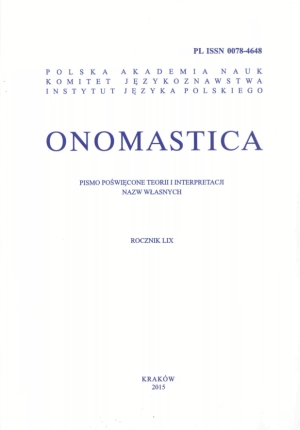Streszczenie
Goździkowa przypomina… Concerning the Word Formation of Proper Names in the Texts of Advertisements
The article contains an analysis of the word formation of proper names which are used in the texts of advertisements. The analyzed examples are drawn from the texts of advertisements found on television, radio, press, the Internet etc. which were produced at the end of 20 th century and the beginning of 21 st century. The article analyses two categories of these proper names: word formations which are used in contemporary Polish language (f.e. Robuś, Marysia, Stefcia, Kasia, Jasio, Krzyś, Rozalka, Basia, Bartuś, Sabinka, Julka, Karinka, Tomek, Adaś, Goździkowa) and neologisms f.e. Zapobiegalska, Zarażalski, Kichalska, Krzywonogi, Przyklapiusz, Musztarderowie, TurboDymoMan, SuperEs, Zozolka, Łazienkowo). The analysis conducted in the article proves that both types of proper names, which are word formation derivatives, appear relatively often in the texts of advertisements. This is the case since they are easy to form (advertisements take the majority of them from usage) and can perform many functions, which advertisements willingly use for their own needs. Proper names that are word formation derivatives and just proper names serve mainly as an assessment as they connote the values appreciated both culturally and socially and the values attributed to proper names are carried on the advertised products. Proper names which are derivatives create a desired picture of advertised products more expressively than other proper names, thanks to their clear word formation structure. Moreover, they expose their commercial assets so they fully use and at the same time cocreate the system of values of consumption culture.
Bibliografia
Bubak, J. (1993). Księga naszych imion. Wrocław: Ossolineum.
Doliński, D. (2005). Psychologiczne aspekty reklamy. Gdańsk: Gdańskie Wyd. Psychologiczne.
Kuźmiński, M. (2017). Cudze dzieci mniej nas obchodzą. „Tygodnik Powszechny” nr 43, s. 16–17.
Łuc, I. (2013). Nazwy własne w ponowoczesnych tekstach reklamowych. Białostockie Archiwum Językowe, 13, s. 187–202.
Łuc, I. (2015). Nazwy własne jako nośnik wartościowania w tekstach reklamowych. Onomastica, LIX, s. 77–91.
RogowskaCybulska, E. (2013). Michałowa ‛żona Stacha’. W: M. MilewskaStawiany, E. RogowskaCybulska (red.), Mówię, więc jestem. Rozmowy o współczesnej polszczyźnie. T. 4. Gdańsk: Wyd. UG, s. 285–289.
RyłkoKurpiewska, A. (2011). Skąd znamy Goździkową? — czyli o różnych sposobach charakteryzowania bohatera w reklamie. W: J. Kreft, R. Stopikowski (red.), Media, biznes, kultura. T. 2, Gdańsk: Marpress, s. 37–49.
Skudrzyk, A. (1996). Nazwiska żeńskie z przyrostkiem owa we współczesnej polszczyźnie ogólnej. Język Polski, LXXVI, s. 17–23.
Zboralski, M. (2000). Nazwy firm i produktów. Warszawa: Polskie Wyd. Ekonomiczne.
Żurek, A. (2008). Teorie grzeczności językowej. Acta Universitatis Wratislaviensis, 3143. Kształcenie Językowe, 7, s. 33–43.

